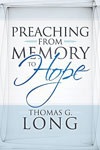Skill Builders
Article
America's Gnostic Impulse

Preaching from Memory to Hope
By Thomas G. Long
Louisville: Westminster/John Knox, 2009
About every fifty years, Thomas Long observes, American preaching suffers a nervous breakdown. When this happens, preachers abandon the structures and strategies that used to work and "begin to scramble for the next, new thing." The current next new thing, according to Long, is actually something very old—a revival of Christian Gnosticism. Long does not mean that American Christians have returned to the theological assertions that occupied the church during its first three centuries, so much as to what he describes as the "gnostic impulse." He characterizes this as "a counterforce, a reaction that erupts here and there in church history in response to what is seen as the barrenness and oppressiveness of what the church is teaching."

American Gnosticism, as Long defines it, is marked by several key characteristics. Foremost among them are a mistrust of Christian orthodoxy, dissatisfaction with its explanation for the problem of evil, doubts about its eschatological hope, and revision of its interpretive approach to the Bible. This is combined with a conviction that Christianity needs to be radically transformed from top to bottom, a spiritualizing hermeneutic, and a conviction that some people are closer to God than others by virtue of what they know. "When these seven meteorological conditions prevail in the church and in the culture in which it lives," Long warns, "a number of reactions could set in, but one likely weather forecast is for an increased chance of disillusionment on the part of intellectually keen Christians, followed by gnostic thunderstorms."
Long sees all of these traits reflected in the writings of Marcus Borg, a popular author and member of the Jesus Seminar. Borg's books have challenged orthodox ideas about who Jesus was and opts for a view that Long critiques as more an exercise in self-projection than historical criticism: "More than a century ago Martin Kähler noted that people who try to draw out of the four Gospels a biography of Jesus are compelled to insert into the process a 'fifth Gospel,' namely their own faith and priorities. Jesus historians start out gazing into the Gospels, but the written texts quickly turn into mirrors reflecting the needs, issues, and faces of the scholars themselves."
Why should we care? Gnosticism should concern us because its ideas have long since left the arcane halls of academia and entered the popular mainstream. It may be too strong to say that the remarkable popularity of Dan Brown's The Da Vinci Code did for Gnosticism what Left Behind accomplished for end-times eschatology. But it cannot be denied that the ideas espoused in popular Gnosticism trouble many who listen to our sermons. Long reminds us that we have a pastoral responsibility to address the questions that Borg and others like him have raised for our hearers. Their books (which I often find on the best-seller racks in my local library) have caused many to question whether the church is hiding the secret truth about Jesus.
Long advises modern pastors to address this problem with the threefold strategy that the church father Irenaeus employed to answer the Gnostic threat of his day: Teach according to the rule of faith, read the canonical Scriptures in the assembly, and emphasize the apostolic continuity of the church's leaders. "To put these strategies into play in our own context," Long explains, "would mean that we would, with as much gentleness and hospitality as possible, publicly teach and preach the great themes, ideas, and claims of the Scripture, and show why the church sees it as a matter of human flourishing to preserve the contours and claims of the gospel."
This more than anything else, underscores why we should care about popular Gnosticism. It is a view that threatens the fundamental core of the Christian faith. "When all these strands are bundled together," Long warns, "Gnosticism doesn't merely inflect the accent of the Christian faith; it changes its grammar and distorts its memory, and makes it speak in a tongue alien to the gospel." Long's criticism of modern Christian Gnosticism manages to be both pointed and irenic at the same time, except when he speaks of pre-millennialism, a theology which he seems to dislike almost as much as Gnosticism. As for solutions, Long reminds us that there is only one answer to this ancient problem. The remedy for modern Gnosticism is the proclamation of the gospel, with its emphasis on the reality of the incarnation and the future hope of Christ. "Like the risen Christ himself," Long reminds us, "preaching is a word from God's future embarrassingly and disturbingly thrust into the present, announcing freedom in a time of captivity, the gift of peace to a world of conflict, and a joy even as the lamenting continues."
John Koessler is professor and chair of the Pastoral Studies Department at Moody Bible Institute in Chicago, Illinois.










